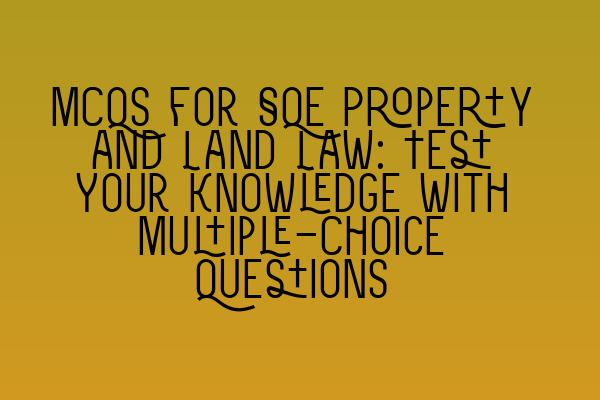MCQs for SQE Property and Land Law: Test Your Knowledge with Multiple-Choice Questions
Welcome to SQE Property Law & Land Law, where we specialize in providing expert insights and guidance on all aspects of property and land law. Today, we are excited to offer you an opportunity to test your knowledge with our multiple-choice questions (MCQs). Whether you are studying for the SQE or simply seeking to enhance your understanding, our MCQs are designed to challenge and educate, ensuring you are well-equipped to navigate the complex world of property and land law.
Before we delve into the MCQs, let’s briefly touch on the importance of understanding property and land law. Property law governs the rights and obligations concerning the ownership, use, and transfer of real property. It encompasses a wide range of legal principles and concepts, such as property rights, estates, tenancies, mortgages, and easements. Land law, on the other hand, focuses specifically on the legal framework surrounding the ownership and use of land and the associated rights and responsibilities.
Now, let’s kick off the MCQs!
1. Which of the following is NOT a type of estate recognized under English law?
a) Fee simple absolute
b) Life estate
c) Leasehold estate
d) Freehold estate
Hint: If you are unsure about the different types of estates, you may find our article on “Understanding Contractual Capacity: Rights and Limitations” helpful.
2. True or False: A mortgage is a legal document that transfers the title of a property from the mortgagor to the mortgagee until the mortgage debt is fully paid.
Hint: If you want to brush up on your knowledge of mortgages, our article on “Interactive SQE Mock Tests for Contract Law: Test Your Knowledge” is a great resource.
3. Which of the following is a key characteristic of an easement?
a) It grants exclusive possession of the servient land to the dominant owner.
b) It is a personal right that is not attached to any particular property.
c) It may be acquired by prescription through long use.
d) It can only be created by express written agreement between the parties.
Hint: Easements can be quite complex, so our article on “Join Our SQE Contract Law Webinars: Expert Insights and Guidance” may provide valuable insights into this topic.
4. Which of the following is NOT a requirement for a valid leasehold estate?
a) The lease must be in writing.
b) The lease must be for a term of more than three years.
c) The lease must grant exclusive possession to the tenant.
d) The lease must include a rent provision.
Hint: For a detailed analysis of leasehold estates, check out our article on “Contract Law Reforms: An Analysis of Recent Changes.”
5. True or False: Adverse possession is a legal doctrine that allows a person to acquire ownership of another person’s land by occupying it openly, continuously, and adversely for a certain period of time.
Hint: If adverse possession is a topic you need more clarity on, our article on “Parties in a Contract: Rights and Responsibilities” offers a comprehensive discussion.
Now that you’ve completed the MCQs, it is time to see how well you did. Here are the answers:
1. d) Freehold estate
2. False: A mortgage is a security interest in real property that remains with the mortgagor.
3. c) It may be acquired by prescription through long use.
4. a) The lease must be in writing.
5. True: Adverse possession can, under certain circumstances, lead to a person acquiring ownership of another’s land.
How did you do? Did you find these questions challenging? Remember, property and land law is a vast and intricate subject, so it’s only natural to encounter complexities along the way. If you found these questions difficult, don’t worry! We are here to help.
At SQE Property Law & Land Law, we offer a range of resources to support your learning journey. From comprehensive webinars to expertly written articles, our aim is to provide you with the knowledge and guidance you need to succeed. So, if you’re ready to dive deeper into the world of property and land law, we invite you to explore our related articles:
– “Understanding Contractual Capacity: Rights and Limitations” offers insights into the different rights and limitations surrounding contractual capacity.
– “Interactive SQE Mock Tests for Contract Law: Test Your Knowledge” provides interactive mock tests to further challenge your understanding of contract law.
– “Join Our SQE Contract Law Webinars: Expert Insights and Guidance” offers access to expert-led webinars that delve into various contract law topics.
– “Contract Law Reforms: An Analysis of Recent Changes” provides an in-depth analysis of the recent changes in contract law.
– “Parties in a Contract: Rights and Responsibilities” explores the rights and responsibilities of parties involved in a contract.
We hope these resources will enrich your understanding and help you excel in your property and land law studies. Remember, knowledge is power, and by continuously testing and expanding your knowledge, you are equipping yourself with the tools necessary to succeed in the field of property and land law.
Thank you for joining us in this MCQ journey, and we wish you the very best in your studies!
